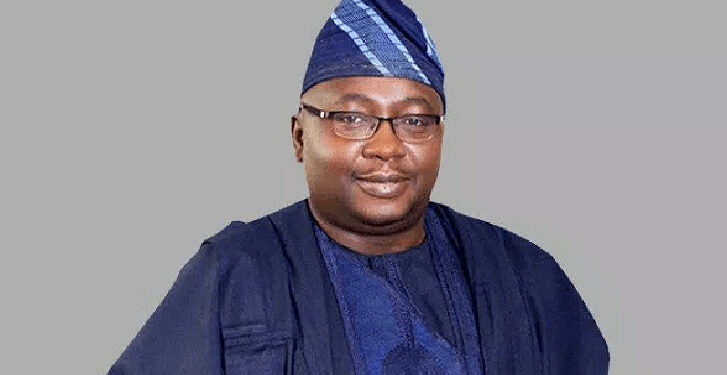Experts, unions differ over FG’s plan to restructure TCN
The announcement by the Minister of Power, Adebayo Adelabu, that the Transmission Company of Nigeria (TCN) will be unbundled in fulfillment of the 2023 Electricity Act has generated uproar among labour union members. The unions, while expressing their opposition, pointed out that government was trying to drag the transmission aspect of the Nigerian Electricity Supplying […]

Minister of Power, Adebayo Adelabu
The announcement by the Minister of Power, Adebayo Adelabu, that the Transmission Company of Nigeria (TCN) will be unbundled in fulfillment of the 2023 Electricity Act has generated uproar among labour union members.
The unions, while expressing their opposition, pointed out that government was trying to drag the transmission aspect of the Nigerian Electricity Supplying Industry (NESI) into the same path of the infamous privatization of the defunct Power Holding Company of Nigeria that birthed 18 companies.
With Nigeria still grappling to have a sustained power supply 10 years after privatisation, the union said the government should seek for review of the past privatisation instead of unbundling the transmission sector which, it said is a ruse for the eventual privatisation of the sector.
What the law says
The act which was signed into law by the present administration but was passed by the ninth assembly said an Independent System Operator (ISO) would be carved out from the TCN, which would continue as a transmission service provider.
Section 67(1) of the act stated that the ISO would focus on system operation by allowing: “generation scheduling, commitment and dispatch; transmission scheduling and generation outage co-ordination; transmission congestion management; international transmission co-ordination; procurement and scheduling of ancillary services and system planning for long term capacity.”
The minister, while expressing his readiness to carry out the restructure led to the National President of the Nigerian Labour Congress (NLC), Joe Ajaero, into expressing his opposition to the plan which, he said, is imbued with ulterior motives.
Ajaero noted that the plan to restructure is ‘’the same big grammar that was spoken before and during the failed privatisation exercise of the sector. They are the same stories that Nigerians have heard over the years which have largely yielded no significant results except the increased suffering that the exercise became for Nigerian people and the economy.”
He warned that the word ‘unbundle’ was akin to misery to the “workers and masses” of Nigeria as previous policies labelled the same forced them to go through hardship.
Unbundle will lead to eventual privatisation
When Daily Trust contacted The President of the National Union of Electricity Employees (NUEE), Engr. Martin Uzoegwu, he said the same opinion, stating that government wanted to foist a gradual privatisation of the TCN through the move.
Uzeogwu who alleged that buyers have been “pencilled down” said, the government would have focused on the review of the failed privatization in 2013 instead of making moves to unbundle the transmission sub-sector of the NESI.
While admitting the minister is acting in view of the law, he said “the DisCos were sold to those who do not have the technical competence and managerial skills to manage the companies, 10 years after the privatisation, we still remain where we were. ‘’They started with unbundling, from there it moved down to privatization. The same approach is being used and we believe that efforts should be made to study the system, before moving into such testy policy because it has not helped.
But The CEO at Sage Consulting & Communications, Bode Fadipe, said the unions are getting it wrong to voice out their opposition after the law has been passed.
He said the minister can’t be faulted for following the law.
Even though he said their concerns are germane as the previous privatization failed to accomplish its purpose, he advised they should have gone to the National Assembly to trigger the process of amending the portion of the act due to previous experience.
“Lobbying is part of democracy and it is common in every democratic setting and if it is upheld it is now a law. But I am afraid the minister can’t be faulted for following the law.”
He however asked if the unbundling would translate into efficiency. “You can’t give a categorical answer to that because you have not tested it.”
On his part, the President of Nigeria Consumer Protection Network, Kunle Kola Olubiyo, said the unions’ opposition is borne out of fear of job loss.
“The truth of the matter is that the labour naturally kicks against any privatisation as they believe it will throw people out of job, but this is an entitlement mentality they have held on for long.”
He said the Project Monitoring Unit of the TCN has been known as an avenue of making illegal money by government workers, thus underpinned their concerns.
He however said there is the need for the government to sit down and have a conversation with the workers to quell their fears of job security after the restructure.
But when asked, Uzeogwu said it is not the basis for the union’s opposition but the fear of the sector dragged into further abyss of government privatisation of critical assets to cronies who do not have the capacity to develop the sector.
“These are the same people the government is using to deceive Nigerians that the policy will work. Nigerians should equally rise up and start talking about things. It is not when they have finished doing what they want to do, because they have power that Nigerians will start commenting. The policy should be halted now,” he said.
